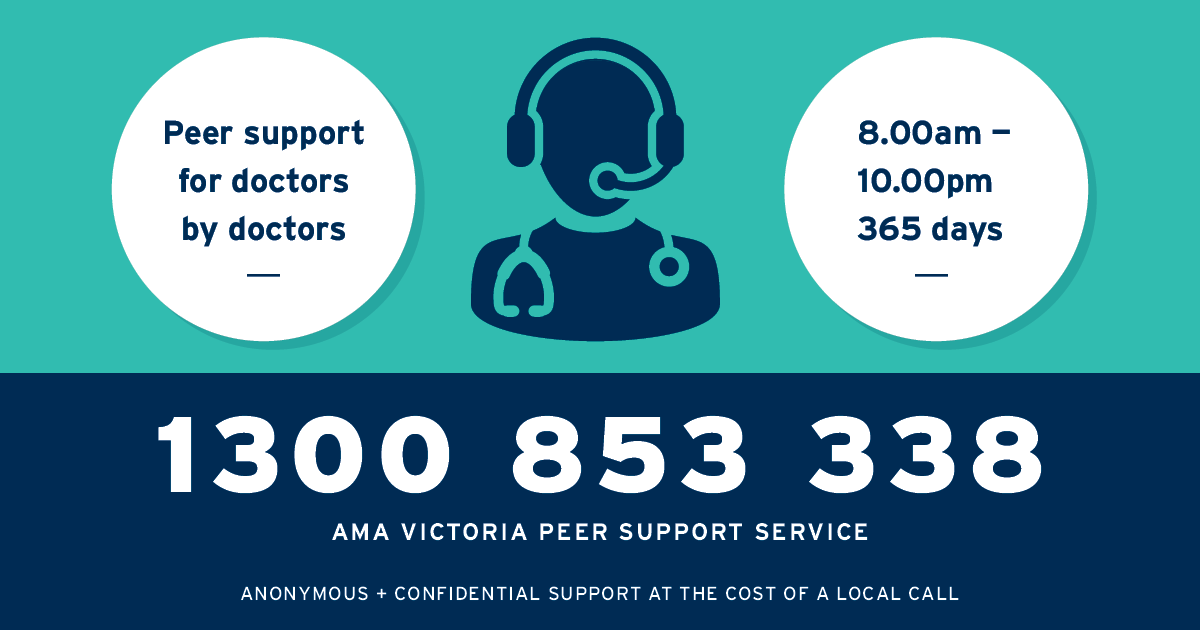Peer Support every day of the year 8am to 10pm on 1300 853 338
The AMA Victoria Peer Support Service is available at the end of the phone line for all doctors and medical students every day of the year from 8am to 10pm on 1300 853 338. This valuable anonymous and confidential service has been operating for 16 years and is provided by a great team of volunteers who are all experienced doctors who have undertaken training to provide non-judgmental support over the phone.
New volunteers who are experienced doctors are welcome to join the current Peer Support team. Our team of doctor volunteers come from a wide variety of specialties and generously give up their time to talk to colleagues who need a listening ear or advice on support.
A training weekend is held annually for new volunteers. Training involves the full weekend, taking 16 hours over the two days. Training requires in-person attendance in Parkville and is not suitable for online participation as it involves role plays and interactive discussion. New volunteers are trained, in a small group, on all aspects of non-judgmental crisis support.
All enquiries to [email protected].
Volunteers can go about their daily routine when on duty for the Peer Support Service, provided they are able to take a phone call at any time for most of the day. There is voicemail for the occasions when you are unavailable. Most calls average 20 to 30 minutes but the benefits last a lot longer. Our volunteers get a lot of satisfaction from their role.
What our volunteers say about being involved in the Peer Support Service:
"As a conversation between equals, Peer Support engenders respect and resilience, it’s a two-way process.”
“Having an anonymous service gives doctors in need an opportunity to discuss any issues that affect their lives and their professional careers in safety.”
“It was great to enhance my listening skills with the excellent training sessions we did prior to starting to take calls.”
“There is enormous satisfaction in knowing that you have actually helped a stressed doctor, who is appreciative for your listening, and for supplying information and resources. It is great to meet and engage with other doctors, and our amazing manager Kay, and our psychologist Claire, and to learn from all of them.”
“For me, Peer Support is a way to payback the help I received when I needed it.”
“We now have an excellent new telephone system which makes the job so much easier!”
“Another key benefit is the collegiality of the Peer Support team, Claire, Kay and the medical volunteers who meet regularly to share their experiences so that we can all provide better support to others and to each other. The meetings that we have are really important to build a team spirit and continuously learning to provide a better service.”
“With the organisational experience I had, including considerable time dealing with issues of both senior and junior doctors in a wide variety of health service organisations, and heading towards retirement, I was keen to continue use this experience in a voluntary role. Particularly with junior doctors it is important to know what options are available to them if things go wrong and to be able to help them clarify a course of action. It is often difficult for those who have not had such roles to be aware of options available in health service organisations that can be very supportive of junior staff and be completely private.“
“I have been able to continue to use this experience to assist other doctors to cope with their lives and careers, albeit in a small way.”
Criteria for volunteering with the Peer Support Service
Do you have these qualities?
An experienced doctor or retired doctor who has compassion, empathy, and a listening ear are the key qualities required to be a Peer Support volunteer.
Can you let go of trying to 'fix or save or rescue' someone?
The role is to listen, highlight strengths and empower callers at their time of stress. Everyone's experiences are different, and it is not the individual volunteer's responsibility to "fix or save or rescue" callers but rather to explore the situation and provide support. We also signpost to other sources of assistance and resources when appropriate. Our focus is listening and supporting as a peer who is familiar with medicine and understands the nature of the challenging situations that arise, without needing to have all the answers.
How do you feel about not knowing the ending?
Anyone who calls Peer Support can do so anonymously — it's an important component of the service, but it also means that volunteers usually have no way of knowing what happens to the caller they have been speaking to. This enhances confidentiality and protects both parties.
Can you make the time commitment?
Our rosters are currently 7 days in length, and you choose your own roster weeks to fit around your work and personal commitments. In that week you will receive on average 2 or 3 calls. Most calls last from 10 to 30 minutes, but some last longer. Therefore, volunteering with Peer Support is not appropriate for someone who is working full time in a busy patient-facing role. There are some opportunities to share roster weeks and organise cover for times when you are unavailable. All who undertake training must be in a position to be available to be on the roster. In your first 12 months of volunteering, it is best to undertake at least 3 or 4 rosters to consolidate your skills. Ideally all volunteers undertake at least 2 or 3 rosters a year according to your availability.
Other time commitments include joining the volunteer group meetings over Zoom, which are held 6 times a year in the evening.
